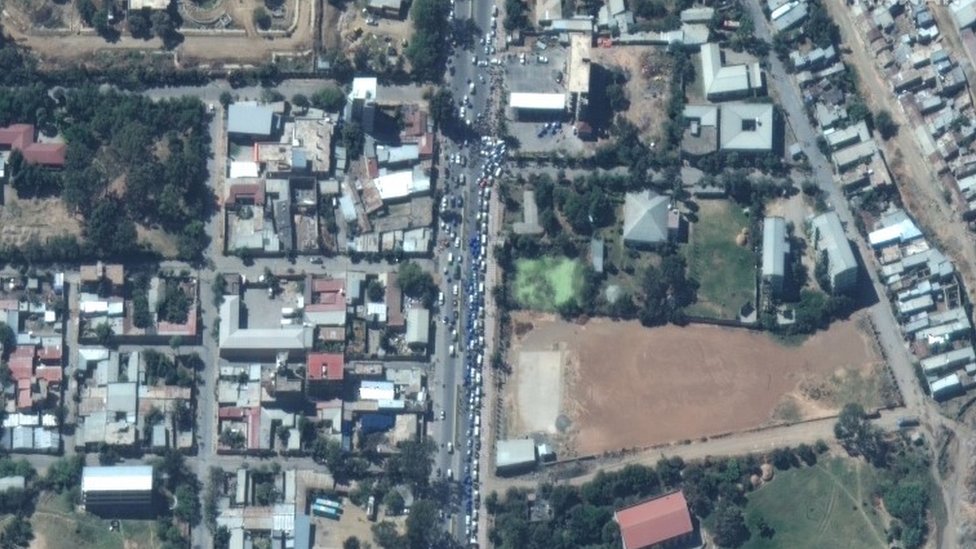Ethiopia's Tigray crisis: PM declares assault on regional capital Mekelle
Ethiopian Prime Minister Abiy Ahmed says he is launching the "final phase" of the army's operation in the northern region of Tigray after weeks of fighting.
He said the military would try not to harm civilians in the regional capital Mekelle - a city of 500,000 people - and urged residents to stay at home.
The TPLF party, which controls Mekelle, has vowed to keep fighting.
The UN warns of possible war crimes if the Ethiopian army attacks Mekelle.
UN human rights chief Michele Bachelet told the BBC the city's inhabitants were in "deep peril".
"We're really alarmed by the dangerous situation particularly because of the civilians trapped in Mekelle," she said, adding that there was "potential for serious violations of international humanitarian human rights law".
Mr Abiy's announcement comes after a deadline he gave for Tigray fighters to surrender passed on Wednesday.
Hundreds of people have reportedly been killed and thousands have been forced from their homes as Ethiopian forces have seized various towns in Tigray from the TPLF.
Details of the fighting are hard to confirm because all phone, mobile and internet communications with the Tigray region have been cut.
Journalist and political activist Daniel Berhane, who is in Mekelle, told the BBC there was no sign yet of any attack, and that shops, cafes and restaurants in the city were "almost full".
Three African Union representatives have arrived in the Ethiopian capital Addis Ababa to try to broker talks but Ethiopia has so far rejected all mediation attempts, saying the conflict is an internal matter and Mr Abiy's government is engaged in a law enforcement mission in Tigray.
The three envoys will not be allowed to travel to Tigray.
Also on Thursday, Ethiopian troops were deployed along the Tigray region's border with Sudan, where they prevented people fleeing the violence from leaving the country, according to refugees.
A BBC correspondent on the Sudanese side of the border saw at least a dozen members of the Ethiopian military, leading to a marked decrease in the number of people crossing into Sudan.
More than 40,000 people have fled Ethiopia since the conflict began.

Fears of costly Mekelle offensive
By Kalkidan Yibeltal, BBC News, Addis Ababa
In the "final phase" of the military offensive that PM Abiy launched following the expiry of the 72-hour ultimatum, he spoke of a military strategy in which top personnel of the TPLF would be brought to justice without harming civilians or properties in and around Mekelle.
It is not clear what that strategy is but it will not be easy to carry it out, particularly if there's active fighting in the city. Artillery attacks, as were suggested by an army official last week, and airstrikes are particularly difficult to conduct without killing civilians and destroying civilian infrastructure.
The federal government's troops could be met with a sort of guerrilla warfare from the area outside Mekelle.
And it could also take longer than the government would like to conclude the offensive. That could mean a worsening of the humanitarian crisis and consequently more international pressure.
In the past three weeks the government has taken control of a number of areas in Tigray but at a cost. An offensive on the state capital - believed to be the main stronghold of the TPLF - could be even more costly.

What did PM Abiy say?
He ordered the Ethiopian military to launch an offensive on Mekelle in the "third and final phase" of the federal government's military campaign against the TPLF.
Mr Abiy said "great care" would be taken to protect civilians and "all efforts" would be made to limit damage to Mekelle.

He urged people in Mekelle and the surrounding areas to disarm, stay at home and keep away from military targets.
Religious and historical sites, institutions and residential areas would not be targeted, he said.
How is the TPLF responding?
The leader of the powerful regional party, Debretsion Gebremichael, has said Tigray forces are "ready to die in defence of our right to administer our region".
The TPLF fighters, drawn mostly from a paramilitary unit and a well-drilled local militia, are thought to number about 250,000. Some analysts fear that the situation could turn into a guerrilla conflict - with the TPLF continuing to mount attacks on government forces even if they take Mekelle.
One example of how this might play out is the battle for Aksum airport, which according to pro-government sources fell to Ethiopian forces on 11 November and is still controlled by them.
But 11 days after the capture state media published pictures of the runway apparently strewn with rubble and with trenches dug across it to prevent planes landing, accusing the TPLF of sabotage attacks. Mr Debretsion denied destroying the airport, saying his forces had put up obstacles to stop the Ethiopian army.
Reuters quoted a diplomatic source as saying the TPLF "have mobilised lots of people in Mekelle". The person added: "They are digging trenches and everyone has an AK-47 [rifle]."
Aid groups fear the conflict could trigger a humanitarian crisis and destabilise the Horn of Africa region.
Ethiopia's state-appointed Human Rights Commission has accused a Tigrayan youth group of being behind a massacre earlier this month in which it says more than 600 non-Tigrayan civilians in the town of Mai-Kadra were killed. The TPLF has denied involvement.
Source: BBC













